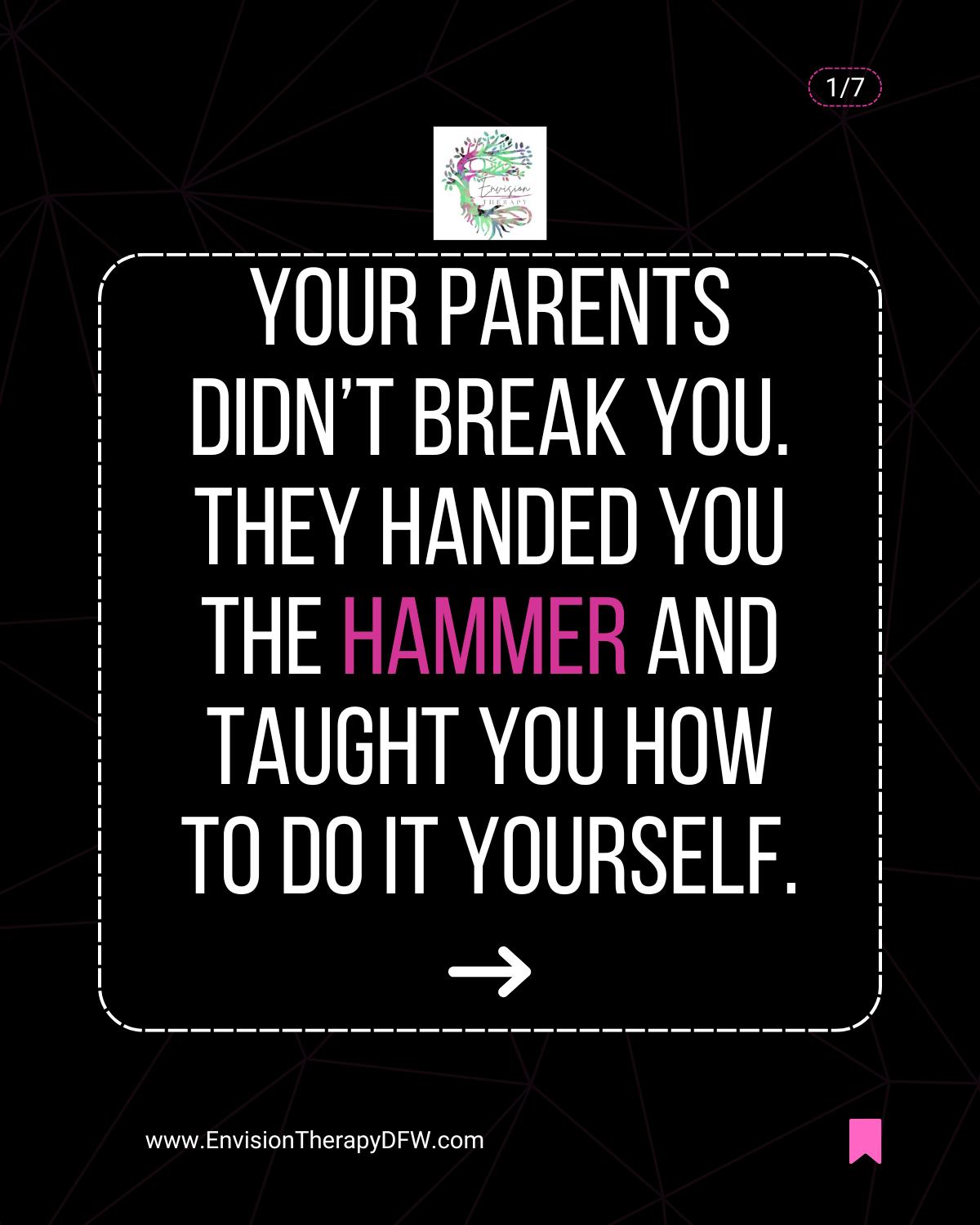Feeling Broken Isn’t Your Fault
Have you ever felt like the cracks in your self-esteem, the endless cycle of doubt, or your inability to set boundaries were evidence that you’re somehow broken? If so, I need you to hear this: you’re not broken, and it’s not your fault.
For many adults, the struggles they face in relationships, work, or even with their own inner critic can be traced back to the lessons they learned in childhood. But here’s the real twist: most of these lessons weren’t intentional. They were survival tools passed down by people who didn’t know a better way. This doesn’t excuse the harm you experienced, but it does change how we approach healing. Today, we’re going to unpack the ways these patterns developed, how they show up now, and, most importantly, how to free yourself from them.
What Does It Mean to Be Handed the Hammer?
When I say your parents didn’t break you but handed you the hammer, I mean that much of what feels like self-sabotage or self-doubt isn’t something you created. Instead, it was modeled for you. Maybe you grew up in a household where love felt conditional—on good grades, keeping quiet, or being the “perfect” child. Or perhaps boundaries weren’t respected, and you learned early that your needs didn’t matter. These experiences handed you the tools—tools like self-criticism or people-pleasing—that once protected you but now hold you back.
Misconception: Trauma Builds Strength
One of the biggest myths I hear as a therapist is this idea that “what doesn’t kill you makes you stronger.” Let me be clear: trauma doesn’t make you stronger. It teaches you to survive in ways that often hurt. For example:
- Self-Criticism: You might think, “If I’m harder on myself than anyone else, I’ll never let them hurt me.” But instead, you’ve internalized their voices.
- People-Pleasing: You might think, “If I meet everyone’s needs, they won’t leave me.” But in reality, you’re abandoning yourself.
- Avoidance: You might avoid conflict or vulnerability because it once kept you safe, but now it keeps you disconnected.
These strategies were survival tools, not signs of weakness. The problem is, they don’t translate well into adulthood when you’re trying to build authentic relationships or pursue your own goals.
Many clients come in feeling overwhelmed and inadequate in their careers. They constantly worried that their boss secretly thinks they are incompetent. When we dug into these stories, often we uncover that growing up, their parents only praised them when they excelled. Any mistake was met with harsh criticism. Sometimes, our inner voice is not ours—it is theirs. Over time, clients realize that their perfectionism is not a reflection of their abilities but a survival strategy to avoid the shame and rejection they experienced as a child.
Breaking the Cycle
The good news? You don’t have to carry those tools forever. Healing isn’t about blaming your parents or caretakers—it’s about reclaiming your power and learning new ways to relate to yourself and others.
Step 1: Recognize the Patterns
Start by identifying the voices in your head. Are they truly yours, or do they belong to someone from your past? Journaling can help you uncover where these beliefs began. For example:
- When you think, “I’ll never be enough,” whose voice is that?
- When you say yes to something you don’t want to do, ask, “Who taught me that my needs don’t matter?”
Step 2: Reframe the Narrative
Once you recognize these patterns, you can reframe them. For instance:
- Replace “I’m lazy” with “I’m allowed to rest.”
- Replace “I have to earn love” with “I am worthy as I am.”
Step 3: Build a New Toolbox
Healing means creating new tools that serve you better, like:
- Practicing self-compassion.
- Setting and maintaining boundaries.
- Seeking support through therapy or trusted relationships.
Why This Will Work: The Power of Neuroplasticity
The human brain is incredible. Thanks to neuroplasticity, you can rewire old patterns and create new ones. When you replace self-criticism with self-compassion or practice setting boundaries, you teach your brain that these new behaviors are safe. Over time, these healthier habits become second nature, and the grip of old patterns loosens.
If you’ve been feeling stuck in patterns of self-doubt, perfectionism, or people-pleasing, know that you don’t have to do this alone. Therapy can help you uncover where these patterns began and guide you toward freedom and self-compassion. Reach out today to take the first step. Schedule a Free Consultation Today.
TL;DR:
The survival tools you developed in childhood—like self-criticism or people-pleasing—may now hold you back. Healing means recognizing these patterns, reframing them, and building healthier tools for self-compassion and boundaries. Your brain can be rewired for freedom.
self-doubt, inner critic, childhood trauma, healing patterns, perfectionism, people-pleasing, therapy for adults, breaking cycles, neuroplasticity, personal growth
Want to hear from us? Fill out the form below:

